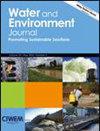Demonstration scale chemical–physical treatment and agricultural reuse of highly saline textile wastewater
IF 1.8
4区 环境科学与生态学
Q4 ENVIRONMENTAL SCIENCES
引用次数: 0
Abstract
This study aimed to develop an energy‐efficient process for treating highly saline textile wastewater (TWW) in a 10 m高盐分纺织废水的化学物理处理和农业回用示范规模
本研究旨在开发一种高能效工艺,用于在一个 10 立方米/天的试验工厂中处理高含盐纺织废水(TWW),并从作物产量、土壤和灌溉设备性能的角度对利用处理后的废水灌溉牧草高粱进行评估。高浓度纺织废水处理试验设备由混凝/絮凝装置、砂滤器和阴离子交换树脂柱组成,处理后的废水符合 ISO 16075-2:2020 C 类灌溉水标准规定的允许限度。相应的平均能耗为 1.77 kWh/m3。在 13 周的周期内,将处理过的原水用于牧草高粱灌溉,作物产量与淡水灌溉相当,且对灌溉系统没有负面影响。虽然经过处理的原水和淡水灌溉的土壤剖面相似,但两种土壤的导电率都有所增加,这可能会对土壤质量造成可逆或不可逆的影响,并损害对盐分敏感的作物。这些研究结果表明,可以有效处理和再利用含盐原水灌溉耐盐作物,对干旱和半干旱地区的工业废水管理和种植模式具有重要意义。
本文章由计算机程序翻译,如有差异,请以英文原文为准。
求助全文
约1分钟内获得全文
求助全文
来源期刊

Water and Environment Journal
环境科学-湖沼学
CiteScore
4.80
自引率
0.00%
发文量
67
审稿时长
18-36 weeks
期刊介绍:
Water and Environment Journal is an internationally recognised peer reviewed Journal for the dissemination of innovations and solutions focussed on enhancing water management best practice. Water and Environment Journal is available to over 12,000 institutions with a further 7,000 copies physically distributed to the Chartered Institution of Water and Environmental Management (CIWEM) membership, comprised of environment sector professionals based across the value chain (utilities, consultancy, technology suppliers, regulators, government and NGOs). As such, the journal provides a conduit between academics and practitioners. We therefore particularly encourage contributions focussed at the interface between academia and industry, which deliver industrially impactful applied research underpinned by scientific evidence. We are keen to attract papers on a broad range of subjects including:
-Water and wastewater treatment for agricultural, municipal and industrial applications
-Sludge treatment including processing, storage and management
-Water recycling
-Urban and stormwater management
-Integrated water management strategies
-Water infrastructure and distribution
-Climate change mitigation including management of impacts on agriculture, urban areas and infrastructure
 求助内容:
求助内容: 应助结果提醒方式:
应助结果提醒方式:


